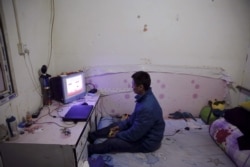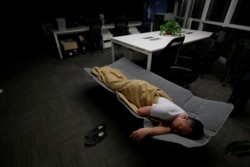Fed up with a culture of overwork, through-the-roof housing prices and skyrocketing living costs, many Chinese youth are "lying flat" to express their frustration with the lack of upward social mobility.
Lying flat includes opting out of getting married, having children, purchasing a home or car, and joining the corporate money-making machine, according to China's online discussion forum Zhihu. The tang ping movement embraces doing the bare minimum to maintain a minimalist lifestyle. It rejects the so-called "996 life" of working 9 a.m. to 9 p.m. six days a week, a tech industry schedule that has bled into other sectors and often fails to provide sufficient income for exhausted workers to get ahead.
And it worries Chinese authorities, as the government has long equated the employment of college graduates with social stability, according to the official China Daily. In the COVID-19-influenced job market, the Class of 2021 is competing for jobs with the still-unemployed members of the Class of 2020, according to the South China Morning Post.
And because the post-pandemic recovery has been driven by an expansion of blue-collar jobs, according to The New York Times, lying flat makes sense to many.
"I graduated from a top university in Nanjing with a degree in architecture two years ago, but I struggled to find a job and stayed there," said Zhang, a 24-year-old living in the rural area of China's southwest Sichuan province, of his choice to lie flat. He asked VOA Mandarin to use just his surname for fear of attracting attention.
Zhang said that a lot of his classmates and friends are still trying to find their way in big cities, "but they come back home either with diseases from overworking or with a mountain of debt."
Lifestyle choice
"I chose to lie flat from the beginning. It's too hard to buy a house and a car in big cities. It's hard to find someone to marry, and if you have kids, you have to enroll them in all sorts of activities to give them a head start," he said. "So I chose my current lifestyle. Simple food, simple life, some gigs to make a little bit of money."
The first online reference to the term appeared in March in the discussion forum Tieba on the Chinese search engine Baidu. The anonymous post "Lying Flat Is Justice" described how to live a happy life without a stable income in a society where the average monthly income of college graduates in 2019 was just over $777, or RMB 5,400, according to the website China Banking News.
"You just lie flat. Lying flat at home, lying flat outside, lying flat like the street cats and dogs. ... I choose to lie flat, and I'm no longer stressed," the post said. The author, who did not specify his income, wrote of working temporary gigs and spending about $32, or RMB 200, a month. The post's author did not reveal his housing costs, but many unmarried Chinese young adults live with their parents.
Government responds
By late May, the Chinese government was countering such notions. "China is at one of the most important stages of its long road to national rejuvenation. Young people are the hope of this country, and neither their personal situation nor the situation of this country will allow them to 'collectively lie flat,'" said a May 28 editorial in the Global Times, a tabloid controlled by the Chinese Communist Party and quoted by Hong Kong's South China Morning Post.
Analysts say the lying flat attitude is rooted in the lack of upward social mobility. People born in the '50s, '60s and '70s benefited from Deng Xiaoping's 1978 policy, a series of transformative economic reforms that opened China up to the international community and foreign investment. The reform set the stage for the emergence of Chinese companies with international reach, such as Huawei and Alibaba.
"In the Deng Xiaoping era, China launched the policy to 'let some people get rich first,'" Xie Fei, a host at Henan Broadcasting System and a current affairs commentator at China's Zhejiang Television, told VOA Mandarin. "Yet the current generation finds that they no longer have the same opportunities as their parents to achieve upward mobility. In other words, they can't expect to have the explosive growth of wealth as their parents' generation."
According to 2017 data from the latest iteration of a recurring Chinese survey by the Chinese Academy of Social Science, people under 35 experienced a high level of unstable employment and relatively low salaries. Lin Thung-Hong, a research fellow at the Institute of Sociology of Academia Sinica in Taiwan, said this is partly due to the economic slowdown in 2015 and 2016. One of the survey's key findings is that college graduates in China face difficulties finding jobs.
"China's economic development has plateaued, young people have fewer job opportunities, and the lying down attitude reflects the difficulties in the overall economy in China," he told VOA Mandarin.
'Just not sustainable'
Once graduates find jobs, many feel they're expected to overwork. Lucy Li, 35, works in the banking industry in Beijing. She asked to use a pseudonym, fearing retaliation by her employer.
"I know 996 is prevalent in the tech industry, but now it has spread to every sector," she told VOA Mandarin. "In our bank, the leadership will drop by unannounced around 8 p.m. to see who's still working, and those still in the office are the ones getting promoted."
"So everyone ends up working 12 hours a day," she said. "It's just not sustainable."
Another worker, Wang, said he quit his job with the tech giant Alibaba because he often started work around 9 a.m., returned home around 7 p.m. and then returned to the office after his two children went to bed, or around 9 p.m. Back at the office, he usually worked until midnight — or as late as 2-3 a.m. if he was developing a product or it was the busy season. He asked VOA Mandarin to use only his surname to avoid attracting attention.
"It's just a culture. We are doing the things we love, but it's also pretty draining if you are working 24/7," he told VOA Mandarin.
In 2019, Jack Ma, founder of e-commerce giant Alibaba, famously said on China's Twitter-like social media platform Weibo that "it's a blessing to be able to do 996."
"If you are not doing 996 when you are young, when can you do it? If we are doing things we love, 996 is not a problem at all," he wrote. Widely criticized, the post was deleted.
The 996 culture has led to death by overwork, a phenomenon first recognized in Japan's workplace culture, or karoshi. Japan passed the Work Style Reform Bill in 2018 to limit brutally long work weeks.
Earlier this year in China, the deaths of two employees of the online agricultural marketplace Pinduoduo sparked discussion of overwork. Many young people took to social media to say they didn't want the 996 lifestyle, and they started to advocate for a more relaxed attitude toward work.
On May 28, Weibo polled users about lying flat. Among the 241,000 people who took the survey, 43% firmly agreed with the concept, 31% said they somewhat agree with it, and another 18% said they would like to lie flat, but they have too many other responsibilities. About 80% of Weibo's 850 million users are 17 to 33 years old, according to a guide to advertising on the site.
The popularity of the lying flat movement concerns Beijing because it runs against Chinese President Xi Jinping's notion of a Chinese dream. In 2012, Xi used the term when he was first promoted to the top Communist Party post, saying China must "strive to achieve the Chinese dream of great rejuvenation of the Chinese nation."
The Global Times quoted Chinese sociologists and educators, saying the younger generations are more self-centered and more sensitive to pressure than their elders. "Instead of always following the 'virtues' of struggle, endure and sacrifice to bear the stresses, they prefer a temporary 'lying down' as catharsis and adjustment," the article said.
The official Xinhua News Agency wrote in a commentary published in late May that "lying flat is shameful. Only hard work brings happiness."
Xinhua later posted a video of an 86-year-old Chinese scientist surnamed Zhao who rises at 4 a.m. each morning to work. "After his retirement, he still works for 10-12 hours a day voluntarily for the country and for the people," Xinhua said.
The video sparked a new wave of criticism among Chinese netizens. One post said, "The scientist is at his fifth level of needs, which is to realize his value in life. I'm at the first level, which is survival. How can you compare the two?" The other read, "Lying flat is not something I actually enjoy; it's a helpless option under the unbearable pressure of life."
Lin, with Academia Sinica, said the immobility in China's economy, society and politics has led to the stagnation of the entire national mobility system. And without social mobility, there would be no "Chinese dream."
"The people are lying flat. The country is dreaming. It's pretty ironic," he told VOA Mandarin.






